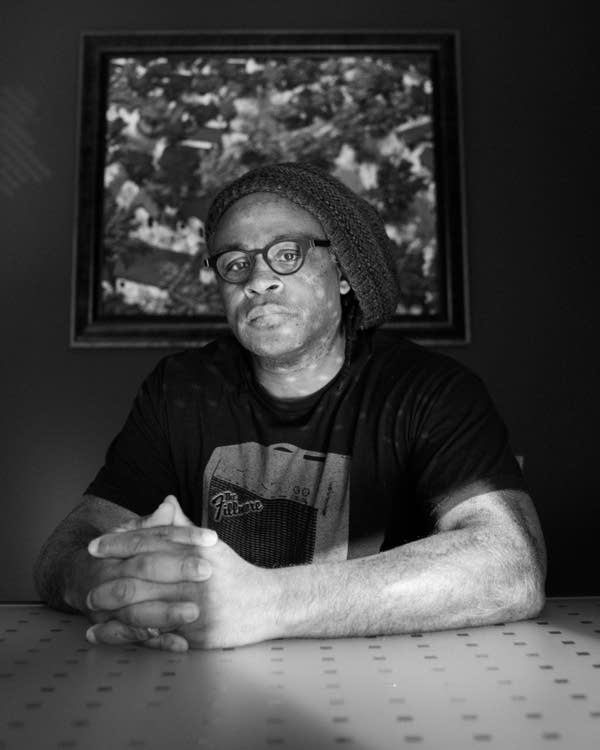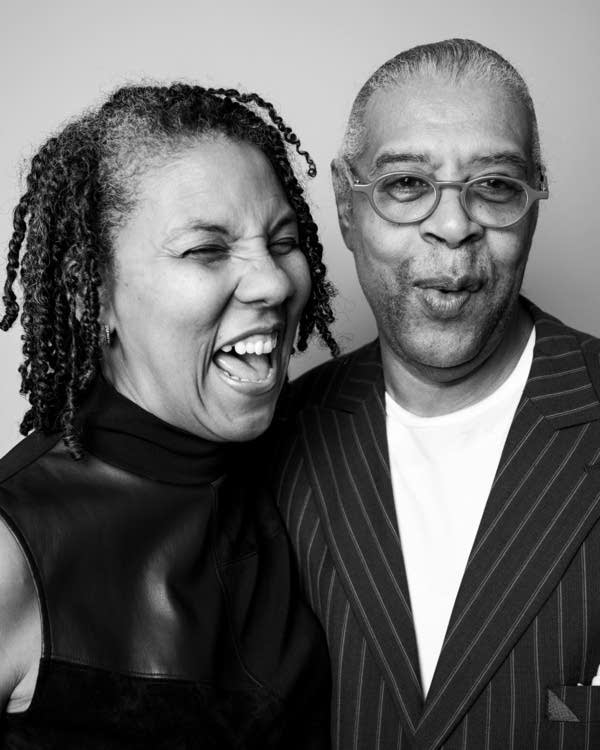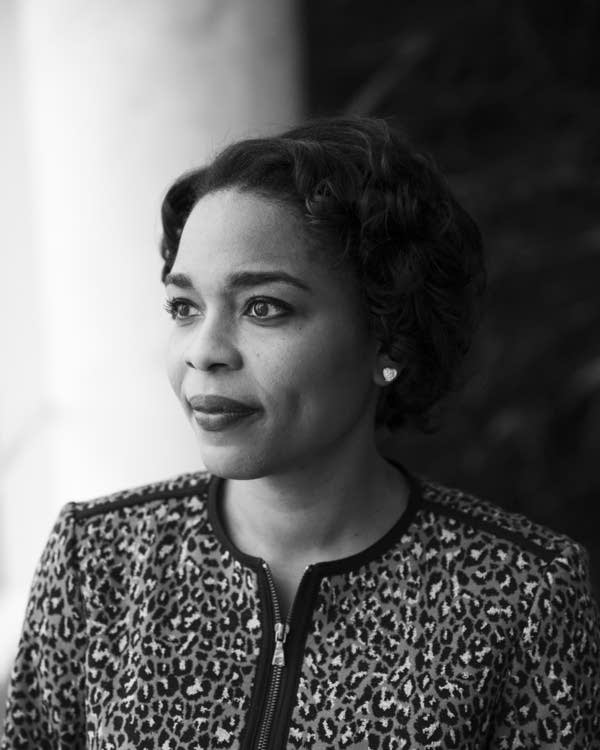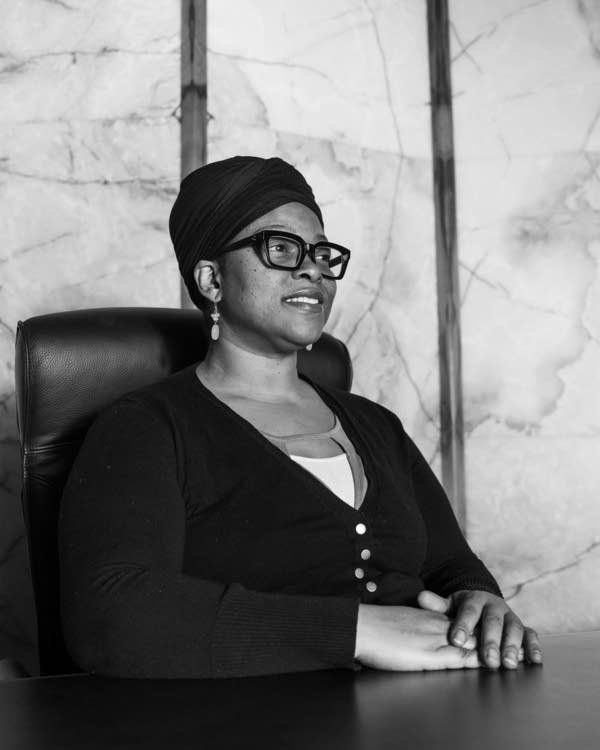ChangeMakers: Black Minnesotans making history
Black History Month celebrates and honors the accomplishments of black Americans through time.
Every weekday this February, MPR News is featuring black Minnesotans who are making history right now across the state. Each profile will discuss what being black in Minnesota means to them, a bit about their background and their hopes for the future.
Farji Shaheer wants to treat gun violence 'like a cancer'
Create a More Connected Minnesota
MPR News is your trusted resource for the news you need. With your support, MPR News brings accessible, courageous journalism and authentic conversation to everyone - free of paywalls and barriers. Your gift makes a difference.

Farji Shaheer, 39, is program manager and director of the Next Step program at HCMC and North Memorial Hospital.
"I'd really like to see it where we can go a whole summer, maybe a whole year without anyone being shot down by nonsensical violence or emotional violence. Also, I would like to see some of the gun laws changed. But that's a different story."
Jerry Holt, telling Minnesotan stories for decades

Jerry Holt, 58, is a Star Tribune staff photographer. A childhood friend bought him his first camera in high school.
"My parents always instilled in me that I was as equal as anybody else. It had nothing to do with my skin color. I was no better or no worse than anyone else. And so I've never had a chip on my shoulder or anything, that I was nothing other than a perfect human being."
Me'Lea Connelly, creating black financial freedom

Me'Lea Connelly, 36, is vision and strategy lead and director of development for Village Financial Cooperative.
"My vision is that we can create a model that a lot of other black communities across the country that are facing really dire socio-economic inequities in their cities and looking for solutions and addressing that in ways that allow them to lead and allow them to have agency."
Verna Price, Shane Price and The Power of People

Verna Cornelia Price, 55, and Shane Price, 64, co-founders of The Power of People Leadership Institute, have helped thousands through their programs, everyone from people incarcerated in state prison to young girls of color.
Shane Price: "I think that African-Americans are experiencing a type of Renaissance. Now, I can't prove it, but I can just tell you I can feel it. There's something moving, there's something on the ground that is calling us together again, this time though with the multitude of people, and it's creating in some ways a new thinking that comes against the old order."
Verna Price: "My vision is to have every African-American child, every African child, every Caucasian child, understand the impact and significance of African-American people and what they bring to this country."
Artiera Evans inspires young minds

Artiera Evans, 31, is a third-grade teacher at Emerson Spanish Immersion Learning Center in Minneapolis. Evans received a national award from a nonprofit called Honored in part because of her work with a shy student who struggled to focus during school.
"Here in Minnesota, it's not quite as overt but we still have racism going on here. I think that being in Minnesota, it's a little bit easier to navigate because it's not quite as in your face but a lot of the subtleties are microaggressions and are definitely something that black Minnesotans have to deal with."
Walter 'Q bear' Banks Jr., instrumental to the Minneapolis sound

Walter "Q bear" Banks Jr., 59, is a DJ and operations manager at KMOJ community radio station. Banks has been broadcasting the Minneapolis sound at the station for 40 years. He's been in the studio as KMOJ has grown from a low-power FM station to a Minneapolis staple, hosting shows on almost every genre of music and directing programming.
"So for me, being a black male in the state of Minnesota is just, stand up and be black and be proud of that because there's been so much negativity that's been thrown at you of what you can't be and what you are not. Everything has been negative. But there's the positive side of when you start looking in the mirror and you see in yourself and you start believing in who you look at in the mirror."
Justice Alan Page and Paris Yarbrough, a legal legend and the next generation

Retired Minnesota Supreme Court Justice Alan Page, 73, was Minnesota's first black Supreme Court justice and is the founder of the Page Education Foundation, which provides scholarships and mentoring to young people of color. He was also an NFL star with the Minnesota Vikings and Chicago Bears.
"You know we're — we all have different abilities and disabilities, but we're all equal. Somehow that gets lost on a day-to-day basis, that somehow because I look different I'm less than. And I dream of the day when that doesn't happen, that you see me and whatever hue of the rainbow I am, you see me just like you see everybody else."
James Badue-El, lifting up the locked up

James Badue-El serves as criminal justice state chair for the Minneapolis NAACP where he works to reduce prison recidivism. In the fall of 2018, he organized the "I'm Proof" awards, highlighting formerly incarcerated men and women making positive changes in their lives and communities.
"I don't have to be a voice for them because they've got their own voice. I haven't got to be a body for them because they've got their own body. Unless they're incarcerated then I am a body for you because you can't have your own body out here in the community, and you still need protection and security as you go through the trials and tribulations while you're incarcerated."
Michelle Walker, getting kids ready to learn

Michelle Walker is executive director of Generation Next. The nonprofit works to close the achievement gaps in the Twin Cities.
"We have a lot to contribute as black Minnesotans. That our voices are heard. That we are able to continue to participate in real meaningful ways, and that the knowledge that exists here is knowledge that can be shared and tapped into by many different communities that we find."
Melvin Carter, first black mayor of St. Paul

St. Paul Mayor Melvin Carter is a fourth-generation St. Paulite and the first black mayor of St. Paul.
"I don't know that my vision for the future of African-Americans in Minnesota is all that different than my vision for the future of everyone. Our mantra is building a city that works for all of us. And that means all of us have to get an opportunity to be a part of the decision making processes that impact our lives."
Leslie Redmond, youngest leader of Mpls. NAACP

Leslie Redmond became the youngest president of the Minneapolis branch of the NAACP when she was elected to the position in March 2018 at the age of 25. Redmond is pursuing her law degree and Master of Business Administration at St. Thomas University.
"We are seeing historical waves from a political standpoint, from the arts and culture, from the professional standpoint, from the young lawyers who are up and coming. I believe that Minnesota black people are really just reclaiming their greatness and are making sure that their voices are being heard."
Judge Juanita Freeman, bringing diversity to the bench in Washington County

State District Court Judge Juanita Freeman's interest in the justice system began as a very young child growing up in Rock Island, Ill. Her parents moved to Minnesota when she was in the fifth grade.
"So my hope is any barrier that exists either literally or figuratively within people's minds — because sometimes we do create that mental space of our own because of our own learned experiences and those experienced by others — that we can break some of that down by pushing forward, by becoming stronger as a people which comes with bonds within the community but also cross-culturally as well."
Pamela Alexander, first black woman judge in MN, sees gaps and opportunities

Retired Hennepin County Judge Pamela Alexander, 66, is a fourth-generation Minnesotan and the first black female judge in Minnesota.
"We were thrilled when Justice [Alan] Page got on the bench. I mean when I started I was the first African-American woman judge. Now there's a bunch of them. I'm happy about that and I think that there is an opportunity if you're prepared for that and can walk through the door and take advantage of those opportunities.
"But, I also think that we're not paying enough attention to our educational gaps. We're not paying enough attention to what we're doing with people who come out of the criminal justice system — to be able to reintegrate them back in and become productive citizens. People can actually really do that."
Blackout Improv, breaking barriers and busting guts

For the last three years, Blackout Improv has been using comedy to tackle tough issues, including white privilege, cultural appropriation and police brutality.
"My goal and what I think would be dope, eventually, is that there are numerous black improv groups, Asian-American improv groups, Native American improv. Like where every single kind of disenfranchised people are represented in a way that it's not like we're a novelty it's not some like big deal."
Dr. LaPrincess Brewer, building 'a culture of health' for the underserved

Dr. LaPrincess Brewer is a preventive cardiologist at the Mayo Clinic and an assistant professor at Mayo Clinic College of Medicine's department of cardiovascular medicine. Her research focuses on creating strategies to reduce heart disease health disparities in minority populations and underserved communities.
"For me it's my interest in achieving cardiovascular health equity for all. I want to do that through all of the training and experiences that God has blessed me with [and] to use those skills to truly make an impact on the community. I really would like to focus on those who are marginalized and are yearning for social justice. I feel that what I'm doing is a form of social justice and improving health outcomes."
Angela Conley changing the system from the inside

Angela Conley is the first African-American elected to serve as a Hennepin County commissioner. She was voted into office in November 2018 and represents District 4.
"I envision this future where our neighborhoods and our communities are thriving and they're beautiful, which they currently are. But more in a way where everyone has access to the same resources, to the same number one park system, to the same avenues of wealth creation that everybody else has or has historically been given."
Andrea Jenkins, first openly transgender black woman elected to public office

Minneapolis City Council member Andrea Jenkins is the first openly transgender black woman elected to public office in the United States.
"My vision for the future of black Minnesotans is a vision of wealth creation, of parity in educational pursuits. The end of criminal injustice that is perpetrated on blacks in Minnesota. Increased homeownership, increased access to health care, increased access to safe and livable communities.
My vision for black Minnesota is to be on par with all of Minnesota."
Phillipe Cunningham, choice to be Minnesotan 'the best decision that I made'

Minneapolis City Council member Phillipe Cunningham is the first openly transgender man of color elected into public office in the United States.
"Being a part of the black community in Minnesota, we have a smaller population. So our interconnectivity and power, there's just so much potential there because of the fact that a lot of us within some activist spaces and whatnot know each other. And so building power around black legislative agendas and things like that, it's been really amazing to be a part of and to witness."
Valerie and Allysza Castile, carrying on Philando's spirit

Valerie, 62, and Allysza Castile, 26, are the mother and sister of Philando Castile. Philando was killed by St. Anthony police officer Jeronimo Yanez in July of 2016 during a traffic stop in Falcon Heights, Minn. Since her son's death, Valerie has been an advocate for police and criminal justice reform and founded the Philando Castile Relief Foundation
Valerie Castile: "We got so much work to do. And people are afraid to change. So there's gonna always be push back and resistance because people are comfortable with the way things are right now. But my vision is that we're gonna be treated equally at some point because if you look at the family dynamics now you have a lot of interracial marriages and there are lots of biracial of children being born ... So you get these different sets of children coming up."
Allysza Castile: "I just envision that hopefully we get the same treatment and equality and privileges as everyone else. I just envision a world of as our coexisting with each other, getting along with each other, having the same opportunities and privileges as other races and also us coming together economically and financially for us as black people."
ChangeMakers: Lou and Sarah Bellamy, using theater to give voice

Lou Bellamy, 75, founded Penumbra Theatre in 1976 to provide a platform for African-American voices. His daughter, Sarah Bellamy, 40, took over as the company's artistic director in 2017.
Lou Bellamy: "The things that shaped us, and shaped my parents and made us as strong as some of us have been fortunate to be, may not be there. But you have to remember that those things shaped your community, your family, your parents [and] so forth. You're heir to a tremendous legacy. ... That is what I want more for future generations than anything: That they be aware of the cost and the price that people paid to put them in a place that they are."
Sarah Bellamy: "I hope for joy. I hope for justice. I hope for peace. I hope for wellness. I hope for a strong tie and foundation to our roots, and to our history, and the courage and wherewithal to dream bigger than we ever thought possible."